

Seychelles Tourism Minister’s message on the occasion of World Tourism Day 2017
Today Wednesday September 27 is World Tourism Day and Seychelles joins the rest of the world to commemorate this day, which aims to raise awareness among the international community of the importance of tourism and its social, cultural, political and economic value.
Sustainable Tourism – A Tool for Development is the theme chosen by the UNWTO this year.
To mark the occasion the Minister for Tourism, Civil Aviation, Ports and Marine has sent the below message:
We must all ensure and take ownership of sustainable tourism
As Tourism Day comes around once again, it gives us the opportunity to reflect on this industry that has become not only the economic mainstay of our nation but also the backbone of the global economy.
It is in this global context that we must continue to celebrate our tourism, echoing the 2017 UNWTO theme which is “Sustainable Tourism – a Tool for Development” because if sustainable tourism is going to part of our culture, then it must become so, not just locally, but internationally.
Sustainable tourism is a term that is much bandied about these days and what, in essence it implies is that we must conduct ourselves and our businesses in such a way that will allow us to continue to do in the future what we do today…only in an ever better and more efficient, eco-friendly way.
To do otherwise, will be to saw through the branch upon which we are seated and deplete our tourism capital so that eventually nobody will wish to come and visit our islands. You may believe that is an exaggeration but let me hasten to assure you that this is a disaster waiting in the wings that has already happened to certain regions of the world.
Sustainable tourism is indeed a tool for development because it recognizes, protects and nurtures the Unique Selling Propositions (USPs) of our country, which are those attributes that most attract visitors to our shores: our pristine, clean environment; our social and political harmony, and our culture which is what the modern traveller increasingly hopes to discover when on holiday.
These are chief among Seychelles’ blessings and behaving sustainably will allow them to continue to be the foundation of the extraordinary Seychelles experience. Sustainable tourism is not only the responsibility of governments…it is the responsibility of each and every one of us to ensure and to take ownership of. To succeed, it must become our way of life and when we celebrate World Tourism Day together, across the planet, we do so in recognition of the fact that we must all do this together!
Here, at home, 2017 is shaping up into another year where tourism records will again be broken. Last year, we smashed the 300,000 visitor ceiling and God willing, this year will see a substantial increase in our visitor numbers which, even now, are on the rise.
And yet, while we rejoice in our good fortune, it is important to keep a sense of perspective because these figures do not arrive by magic or because we are entitled to them.
A great deal of hard work on the part of all the tourism players and stakeholders in the country: STB; the national airline, Air Seychelles; all airlines serving the Seychelles; the DMCs: hotels; boat carters; car hires and the general public all contribute towards making Seychelles attractive to tourists. The day we fail to appreciate this and allow philosophy of ‘business as usual’ to set in, is the day we will fail to attract those numbers.
Much goes on behind the scenes to ensure the continued progress of our tourism and when we see, for example, the return of British Airways to our shores after so many years, you can be sure that it is the result of much hard work on the part of the authorities concerned. And when we see British Airways and other companies investing in doing business with Seychelles, then it is because they believe in us and have confidence in our brand and our product.
The core of my message to you on this tourism day is that we are all in this together. Tourism is our national industry and our individual attitudes towards our industry will influence its success or failure, whichever we choose.
We live at a time of great and intensifying international tension which is already impacting on peoples’ holiday choices. Keeping Seychelles safe, clean and welcoming in nature must become a personal campaign for each and every one of us as we educate our children to do the same.
Happy World Tourism Day.
Ambassador Maurice Loustau-Lalanne
Minister for Tourism, Civil Aviation, Ports and Marine

A message on World Tourism Day from Grenada’s minister of tourism and civil aviation Dr. Clarice Modeste Curwen
Grenada’s Minister for Tourism, Civil Aviation and Culture Hon. Clarice Modeste Curwen issued the following message on the occasion of World Tourism Day:
It gives me great pleasure to celebrate this special observance of World Tourism Day under the theme, “Sustainable Tourism, a tool for development.” Internationally and locally, the tourism industry contributes millions to the economy, creates livelihoods and facilitates a rich cultural exchange. In Grenada, the Tourism Industry provides direct and indirect employment for approx. 11,000 people and in 2015 visitors spent 392 million EC dollars in the economy.
The benefits are tremendous; however, we find ourselves at a crossroads. How do we maximize the benefits from this industry to promote sustainable development and a brighter future for generations to come? How do we as Governments, industry contributors and citizens play our part in making our countries and the world a better place. This means sustainable economic growth, decent jobs, preserving the environment and addressing climate change, celebrating and preserving diversity and culture and promoting peace.
Pure Grenada, Carriacou and Petite Martinique is well on its way to making its contribution in creating a better world by preserving our natural environment. Already, many of our hotels have implemented energy saving measures to their businesses while some have stopped using Styrofoam products. The Government of Grenada has also pledged to table legislation banning the importation of Styrofoam and plastic as part of a proper waste management strategy. The effects of Styrofoam are well known as it is non-biodegradable and its link to cancer has been explored. This ban on Styrofoam and plastic will be a priority going forward.
Our brand Pure Grenada, Spice of the Caribbean reminds us that we should all aspire to do our part to ensure that our island gems remain clean and beautiful. I encourage you to support this brand by incorporating sustainable practices in your lives to achieve this goal whether it’s by conducting a community cleanup, encouraging friends and family to properly dispose of waste or implementing energy saving measures in your homes. Take the pledge today to keep Grenada, Carriacou and Petite Martinique Pure.
As we observe World Tourism Day, Secretary General of the World Tourism Organization Taleb Rifai reminds us that whenever you travel, wherever you travel, remember to: Respect Nature, Respect Culture and Respect your host. Together, our efforts can be the catalyst for meaningful and sustained change through Tourism.
Happy World Tourism Day!
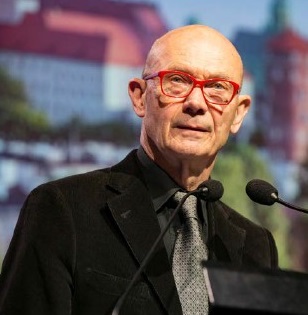
Interview: Chairman of the World Committee on Tourism Ethics
Appointed as Chairman of the World Committee on Tourism Ethics in 2013, Pascal Lamy has been instrumental in the process of presenting the Convention on Tourism Ethics to the 22nd UNWTO General Assembly. Here, he is interviewed at the UN World Tourism Organization (UNWTO) GA meeting in Chengdu, China.
Q. The exponential growth of the tourism sector should translate into higher ethical responsibility. What, in your opinion, are the main challenges that the sector faces in that regard?
A. In the last decades, the number of travelers has multiplied by three and the tourism sector has been growing at a rate of 4% per year. This means that it is necessary to make sure that the 1,235 million tourists travelling today do not become 1,235 problems. Protecting the environment, respecting human rights – particularly those of societies’ most vulnerable groups – and preserving cultural richness and traditions, as well as tangible and intangible heritage, are some of our current challenges. These are also the pillars of the International Year of Sustainable Tourism for Development, pillars that should guide the responsible growth of the sector in the coming decades.
Q. What is the Convention on Tourism Ethics and what impact do you expect it to have in the sector?
A. We presently have a Global Code of Ethics for Tourism, which was adopted in 1999, on how to develop tourism in a responsible and sustainable manner. It is addressed to all stakeholders alike: governments, tourism operators, the hotel sector, tourism workers and travelers. It has been working reasonably well, but we feel that we have to make it stronger. With tourism’s growth we have to take the collective commitment to ethical tourism a step further, via the conversion of the Code into a proper Convention. Probably not all Member States of UNWTO will sign this, but we expect a lot of support. The Code of Ethics is for Member States, operators, industry and consumers. The Convention, being an international, legally-binding treaty, can only be signed and ratified by Member States. Consequently, they are the ones that have to make sure that all actors of their national tourism sectors are responsible and work together to make tourism more ethical. The approval of the Convention, is an ideal achievement of the International Year of Sustainable Tourism for Development that we are celebrating throughout 2017.
Q. What are the key pillars of the Convention on Tourism Ethics?
A. Based on the Global Code of Ethics for Tourism, the Convention has a set of ethical principles that encompass key areas of responsible development, which largely coincide with the UN 2030 Agenda.
• Sustainable development and wildlife, promotion of local culture, waste and energy management, climate change and pollution control);
• Social issues (poverty alleviation, quality of life, protection of children, empowerment of women, accessibility to tourism for all);
• Local community development (local employment opportunities through tourism, local consumption patterns, respect of the rights of indigenous people);
• Improved understanding between cultures (ensuring respect of host societies, transparent tourist information); and
• Labor issues (equal opportunities and nondiscrimination, paid leave, freedom of association, working conditions, career development programs).
Q. How was the text of the Convention prepared?
A. Shortly after the 2015 UNWTO General Assembly, it was decided that the Code of Ethics would have to be converted into an international convention. The UNWTO Secretariat was requested to start preparations to this effect and a Working Group was set up to draft the convention. All UNWTO Member States were invited to be part of the Working Group. As Chairman of the World Committee on Tourism Ethics I participated in all meetings of this Working Group.
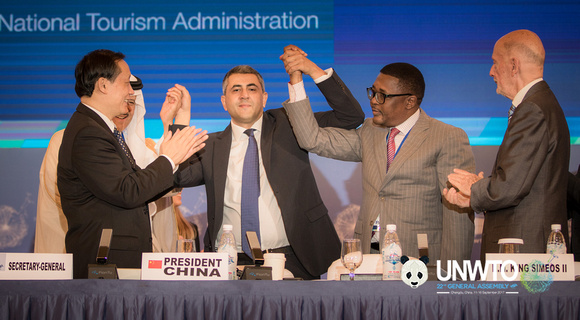
Interview with UNWTO Secretary General elected
UNWTO General Assembly Daily published this prepared interview with Ambassador Extraordinary and Plenipotentiary of Georgia to the Kingdom of Spain, the Principality of Andorra, the People’s Democratic Republic of Algeria and the Kingdom of Morocco, Zurab Pololikashvili, has been appointed by the General Assembly of the World Tourism Organization (UNWTO) as its next Secretary General. Pololikashvili was Minister of Economic Development of Georgia (2009-2010) and Deputy Minister of Foreign Affairs of Georgia (2005-2006).
The author of the Interview was not named:
Q – What are your priorities for the Organization in the four years to come? What would you like to achieve?
A – My vision for UNWTO is fully based on the needs of its Member States, considering current political and economic uncertainties across the globe. Let me briefly present some key areas. One of the top priorities will be to expand the UNWTO membership and attract new countries to join the Organization for them to benefit from its services and activities. Cooperation with new Members on tourism’s contribution to the Sustainable Development Goals (SDGs) is essential in order to assist governments and companies in incorporating relevant aspects of the SDGs into policies and business operations. I will actively encourage leading donor agencies to be involved in the implementation of a wide range of projects and capacity-building programs on national and sub-regional levels. I propose to initiate the following thematic platforms to expand UNWTO’s advocacy work and awareness-raising: a global leaders’ summit on travel and tourism for heads of state, in parallel with the UNWTO General Assembly; an annual ministerial meeting on safety, security and travel facilitation to enhance effective inter sectorial coordination; an annual global ‘invest in tourism’ forum to promote investment opportunities and share best international practices on investment and incentive policies; and an annual ministerial-level forum on climate change and tourism to offer specific recommendations on implementing long-term sustainable development policies. I believe that Member States need more technical expertise from the Organization. In this regard, UNWTO should regularly prepare individual recommendations for individual governments to support sustainable and competitive growth of travel and tourism by developing policy guidelines on destination management.
Q – The current Secretary General, Taleb Rifai, has been described by Member States and the private sector as a consensus builder and a great leader for the sector worldwide. Besides building consensus and showing leadership, what are in your opinion the additional challenges of a UNWTO Secretary-General?
A – First of all, I would like to emphasize that under the leadership of the current Secretary-General, Taleb Rifai, UNWTO and the global tourism industry have achieved tremendous success to become one of the most important socioeconomic sectors. Dr. Rifai increased the visibility of UNWTO and made politicians more responsible for travel and tourism. Besides leadership and an ability to build consensus, I think a Secretary-General should demonstrate dynamism while championing innovation in this challenging time, as well as achieving results-driven outcomes with both government and private sector Members by delivering technical expertise through concrete recommendations and projects.
Q – 2016 will probably be the eighth year of consecutive growth for international tourism, and according to UNWTO ‘Tourism Towards 2030’, it is estimated that there will be 1.8 billion international arrivals by 2030. What is your view on the main challenges and opportunities facing the sector in the years to come?
A – I think UNWTO should be focusing on long-term challenges. Safety and security and climate change are key challenges but there are many other external factors affecting global travel and tourism. UNWTO should undertake serious steps to manage thematic platforms so that dialogue among decision- makers results in effective inter-sectorial coordination. As of opportunities, from my point of view, UNWTO should strengthen its expertise and prepare guidelines on management and marketing for various types of tourism destinations considering current technological advances, new business models and the rise of digital tourism.
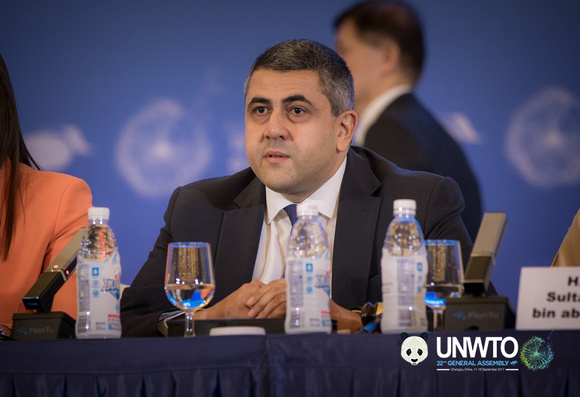
World Travel & Tourism Council congratulates new UNWTO Secretary General
Gloria Guevara, President & CEO, World Travel & Tourism Council (WTTC) today congratulated HE Zurab Pololikashvili on his election to the role of Secretary General of the UN World Tourism Organisation (UNWTO).
Speaking from Chengdu, China, at the UNWTO General Assembly, Ms Guevara said: “On behalf of WTTC and its Members I congratulate Mr Pololikashvili on his election to the role of Secretary General of UNWTO. It is a position of enormous importance to our sector and I look forward to working with him as he will take the organization to the next phase.
The close collaboration between WTTC and UNWTO over the past eight years has resulted in a more unified and cohesive international Travel & Tourism sector, where understanding and cooperation between the public and private sectors has increased considerably. I look forward to continuing this path into the future, where together we highlight the importance of Travel & Tourism for the social and economic development of the world community.
Ms Guevara added: “We are at a critical moment in the development of our sector, where ambitious growth targets need to satisfy not only economic but also environmental and social objectives. It is the responsibility of all stakeholders in the sector to work together to ensure that Travel & Tourism, which accounts for 10% of the world’s GDP and 1 in 10 jobs, continues to be a force for good in our world.”
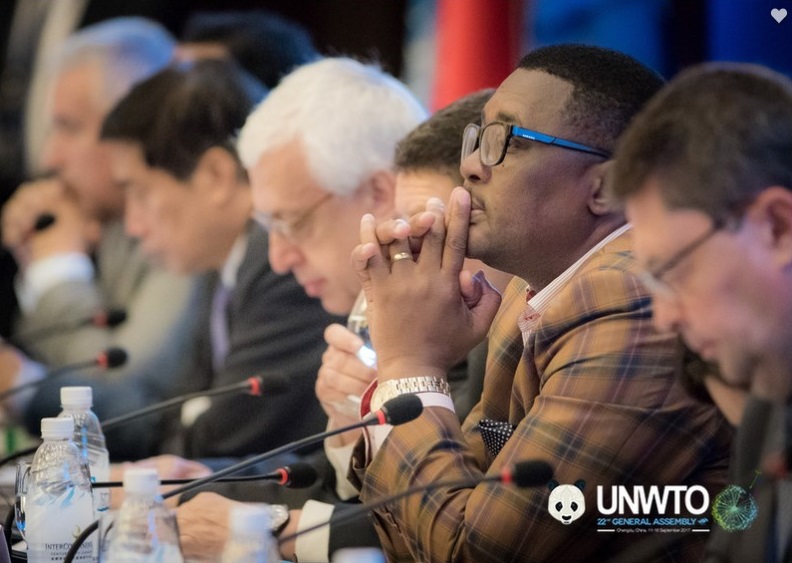
Addressing the UNWTO General Assembly: African style with a sharp global view
Yesterday, the outspoken Minister of Tourism for Zimbabwe, Hon. Walter Mzembi, addressed the General Assembly of the World Tourism Organization in Chengdu, China.
This is a transcript of his moving presentation:
Excellencies, Colleague Ministers, Ladies and Gentlemen:
Let me congratulate the People’s Republic of China on its grand hostess-ship of the 22nd GA of the UNWTO and excellent service and hospitality rendered to our delegations, and of course it’s assumption of the Presidency of the 22nd session.

I know the painstaking and elaborate work and resources invested in such projects, having been host myself for the 20th Session for which I thank you for your support then.
Let me proceed to note the inauguration of the World Tourism Alliance last night, an inevitable happening given your scale and projected leadership as an international source market and unparalleled network of alliances. It’s only natural that you would enter this space of non-governmental and business organization of global tourism, perhaps overdue. We pray the long-term objectives are to complement gaps identified especially in global funding and tourism development clearly missing in our current UNWTO. I hope this will strengthen UNWTO going forward and not duplicate what it is already doing or what other organizations are ceased with already as some of your founding articles may seem to suggest.

And still on this subject I would also plead for inclusivity, especially of the emerging economies, there is nothing global of course without Africa, if you miss Africa you have missed the world, or at least it’s 1.2-billion-people market, and I hope you can hastily include those missing at the very beginning in your structures to inspire confidence and improve the global appeal of the organization.
Zimbabwe is captured in the New York Times of the January 2015 edition as “a once avoided now a must visit destination ”
Rated at no 13, together with Rwanda at no 14 as Africa ‘s top attractions in the Condé Naste Magazine, top 17 destinations for 2017, this country which hosts and shares the majestic Victoria Falls with Zambia, is one of the Natural Wonders of the World. Our chief hospitality product is peace, safety and security.

Zimbabwe makes the claim to a 33-year tourist safety record, with not a single tourist life lost to conflict or war nor insecurity since 1983!
Today Zimbabwe is a $1 billion tourist economy set to grow to a $3 billion economy by year 2020, employs over 300,000 people directly and indirectly.
The Country shares seven trans-frontier conservation boundary areas developed to the scale of the ecosystem, with neighbors, South Africa, Mozambique, Zambia, Botswana, Namibia, and Angola, and has sound biodiversity policies which host a flourishing wildlife population and a diverse flora in its ecosystems.
Beyond its traditional markets in Europe Zimbabwe has developed strong bilateral relations with other parts of the world and has a BRICS growth strategy anchored by China whom it has granted a visa on arrival dispensation. Zimbabwe is largely an open destination with most countries in the world enjoying this visa on arrival preference.
How does one access Zimbabwe from China? You can be connected from OR Tambo, Johannesburg or Cape Town to any destination in Zimbabwe, Harare and VF included in just over an hour, 15 flights a day, or via Dubai, a direct flight of 8hours to Harare or VF.

The World Climate Agency at some stage rated Zimbabwe as host of the best climate on the globe. No natural Disasters except incessant droughts now mitigated by irrigation development. Google Zimbabwe at your own leisure to understand why Zimbabwe has been such a resilient product notwithstanding the adversity it suffered at some stage. We are the most endowed country in mineral wealth. As a colonial state, we were founded by the Rudd Concession because of the attraction of our rich natural resources and fertile soils. Ask the Chinese here they will confirm how they turned our adversity into an opportunity for themselves. Don’t be left out in this modern-day Eldorado to my country.
1) We reaffirm our thrust on finding a sustainable solution to securing peace for Tourism and its facilitation by the Security Cluster, and urge the Secretariat to facilitate more relevant engagements and interfaces for this sector to make its case. Continuing to meet alone and reciting our challenges will not resolve this challenge
2) We urge practical operationalization of the SDGs. As an example, Africa will need 660 billion euro a year to operationalize the SDGs, for the next coming years until 2030, in order to create 20million jobs a year to deal with illegal migration into Europe and other parts of the world, yet our ODA support is just 60billion Euro a year. How do we cover this gap? We have the biodiversity product, people, poor people, who are your greatest prospect and asset to a future source market if we develop a middle class out of them, turn them into tourists not migrants. A generation ago there was no tourist from China, no one wanted to receive you, today we outdo each other to receive you, with some countries giving you up to 10-year multiple entry visas, totally inconceivable a few years ago, WHY, because out of your poor, emerged a middle class of 400million people, out of which 128m today constitute the world ‘s largest source market. 4 billion trips are done internally, serious economic kinetics at play. To keep our people engaged at home we therefore need to discuss serious investment in the tourism sector in Africa and other developing economies to help in the elimination of joblessness, in itself a threat to security, because idle minds concoct terrorism, we have to give youthful lives a meaning to mitigate this major challenge.
So. lip service to resolutions on SDGs that does not translate into practical solutions will make us irrelevant in Cabinet tables where we seek accommodation. Let’s demonstrate Tourism’s greater relevance going forward.
Turning Global:
Finally, I want to thank you for the honor to champion reform and modernization with regards to elective issues around the Secretary General post. It is this post that gathers us every two years in this manner, to listen principally to this person who administers the organization between elective congresses and keeps us relevant to the world, even the best of white papers executed by an inappropriate choice, our collective choice can become for lack of a better expression a black paper. So, this is going to be the best decision of the 106th EC, notwithstanding the acrimony that gave birth to it yesterday, and a lasting legacy of the outgoing SG, I wish it had come sooner though. I pushed it not out of self-interest, NO, but because it was the best thing to do for our organization, someone had to carry the Cross and burden, because that is what leadership is all about. I opted to champion and magnify the cause because I admire the good work Taleb has done in the last decade. I know it, because I have been around long enough, almost a decade nearly matching your service as SG. Genuine friendship is built on honest feedback, no matter how nasty it may appear to those who may be unable to comprehend issues at the time. Equally, China can claim some credit, too, being a world case study and Champion of Reform itself, so we have no choice in this regard than to embrace change. In conclusion, no one appreciates Taleb more than Zimbabwe for standing by my country at its worst and bringing the GA to Zimbabwe, the rest is history. His name is indelibly captured in the memories of our people. I thank you, and God bless you all.
All photos © attreo studio 2017 CDR Photography

Interview: Director of Chengdu Municipal Tourism Bureau
Chengdu, host of the 22nd session of the UNWTO General Assembly, and capital of the Sichuan province, has been described as the ‘Best Tourist City of China’. The Director of the Municipal Tourism Bureau, Duoyang Nemu, explains for the GA Daily the meaning of this title.
Q – Chengdu has been named “Best Tourist City of China” jointly by the World Tourism Organization and the China National Tourism Administration, what are the goals and priorities of its future tourism development?
A – Chengdu has identified the long-term goal of becoming the World’s Tourist Destination City. It is focusing on the following areas: all-around tourism development, optimization of tourism products’ structure, public support service for tourism, “smart tourism” joint development, “Tourism +” industry integration, green/lowcarbon development, opening up and cooperation with foreign entities, international marketing and so on, and is expecting so see results. We hope to comprehensively promote the internationalization of Chengdu’s tourism industry.
Q – Chengdu is the “leisure capital”. It has recently won the title of “China’s Exemplar City for Leisure Tourism “, what do you make of that?
A – This title reflects the sense of happiness of tourists and residents in Chengdu and the quality of life in the city. The people of Chengdu love life, and enjoy life. The beautiful scenery, mild climate, abundant agricultural produce, thriving businesses and rich history gave Chengdu its strong “leisure characteristic”. Chengdu is the birthplace of Taoism, has a rich history of health and sports activities. Colorful recreational activities gave Chengdu the reputation of “Leisure Capital”. In addition to the teahouses that dot its streets and alleys, many wonderful bars, cafés, Sichuan Opera theaters, spa, sports centers and leisure farms make Chengdu a top choice for visitors to relax their bodies and minds. Day and night, Chengdu provides tourists with comfortable and enjoyable leisure options.
Q – Green development is an innovation on the basis of traditional development models. How does tourism in Chengdu implement green development?
A – Chengdu will give full play to the important role of tourism in the areas of stabilizing growth, structure adjustment, promoting reform, benefitting livelihoods, etc. It will utilize the ideas of “all around tourism,” “tourification” of entire industry chains and “tourification” of all factors of production and pursue the goal of making Chengdu tourism bigger and better. Further, it will seize upon the opportunity of being recognized and included in the first batch of the National Ecological Civilization Demonstration Areas, combined with the city’s development plan of “Advance along the East and South, Halt on the West, Re-construct the North, and Improve the Middle”, form a ecological living space that combines “Mountain, City, Lake and Garden” through integrated, green, low-carbon and “cycle economy” development. In this way, it will strengthen the eco-tourism project, establish Chengdu’s international ecotourism brand. It will develop the tourism industry into one that promotes private sector development, urban-rural integration and ecological landscaping. It will develop tourism into a strategic pillar industry and a people-oriented industry that improves the wellbeing of the people.
Q – Can you elaborate on the Green Tourism Standards Certification?
A – With regard to the Green Tourism Standards Certification the process is to follow the strategic path of “ecology first, characteristic development” and insist on the combination of resource development and ecological protection, strengthening and promoting the Green Product System of “National Park, Green Hotels, Green scenic spots, Green Tourism Products”. This way, we will implement the Green Certification scheme for tourism products and enterprises.
Q – In that framework you talk about the champions of ecotourism.
A – Yes, the strategy of developing champions of eco-tourism includes examples such as the Pingle Ancient Town-Tiantai Mountain National 5A-level Tourism Site, Qingcheng Mountain National-level Tourism Resort, Snow-capped Xiling Mountain-Huashui Bay Hot Spring National Tourism Resort and Three-Lakes-One-Mountain National Tourism Resort. We will actively promote the construction of an eco-recreational zone around the city, an international RV camp, and an international RV network. We will also consider developing a number of holiday villages, private accommodations, a start-up town and theme inns, in this way we can promote and upgrade rural tourism. Thirdly, we will implement energy efficiency programs for tourism. We will actively promote green tourism development and Low-carbon operations, develop eco-friendly tourism environment and ecointensive tourism economic system. Fourthly, we will implement the Green Tourism Initiative. With the theme of greenness, we will advocate low-carbon tourism, green consumption, so as to make tourism an advantage industry in a “two-type society”. Fifthly, we will implement Green Tourism Development Incentive Scheme. By implementing “Chengdu City policy measures on the promotion of tourism reform and development” and “Chengdu Tourism Promotion Regulations”, we should be able to ensure the healthy development of green tourism in our city from an institutional level.
Q – Chengdu is the world’s “food capital”, what are the characteristics of its food?
A – The characteristics of Chengdu Sichuan Cuisine are “Spicy, Hot, Tasty and Aromatic”. With more than 6,000 different dishes, each Chengdu/Sichuan dish has its distinct flavor. Moreover, there are authentic French, Japanese, Thai and other cuisines that can be found in Chengdu, providing visitors with more personalized choices.
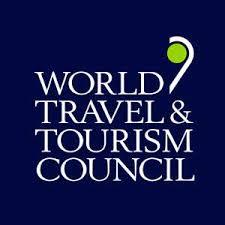
WTTC statement of support to destinations impacted by Hurricane Irma
Today, the Chairman and the President & CEO of the World Travel & Tourism Council (WTTC) issued a joint statement in response to the devastation caused by Hurricane Irma, extending the Council’s full support to all impacted destinations.
Chairman Gerald Lawless and President & CEO Gloria Guevara offered the services of WTTC and called upon WTTC Members to come forward and understand the ways in which assistance can be provided to the devastated destinations in the Caribbean and southern United States to ensure a rapid recovery for their essential tourism industries.
WTTC also offered to send a High Level delegation and advisors, when it is appropriate to do so, to evaluate and provide recommendations for solutions to assist with the recovery process.
Ms Guevara said: “Tourism is a significant driver of the Caribbean countries’ economies and local livelihoods, and the Caribbean has been a popular and high profile destination for many years. WTTC therefore commits to play a part in the region’s recovery, standing by to assist with the restoration of tourism markets and infrastructure as the Hurricane passes, impacts are measured, and the rebuilding can commence.”
“The Caribbean is a beautiful tourist destination. Travel & Tourism generated 15% of the Caribbean’s GDP and 13% of the region’s employment in 2016. I strongly believe that both the travellers and the destinations will show their resilience and that once damage is assessed and the businesses re-open, travellers will return. WTTC offers to help in all stages of recovery,” added Mr Lawless.
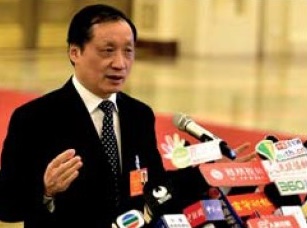
Interview: Chairman of the Chinese National Tourism Administration
The UNWTO General Assembly Daily spoke with the Chairman of the Chinese National Tourism Administration, Li Jinzao, shared here.
Q. China has become one of the leading tourism destinations in the world in recent years. What are the prospects for the future of the sector in China and the main objectives set for tourism?
A. China’s tourism sector had a relatively late start and a weak foundation. Yet due to over 30 years of hard work since the reform of its tourism sector, China has become the world’s biggest outbound tourism consumer and the fourth-largest international destination, with the biggest domestic tourism market. According to the World Tourism Organization (UNWTO), in 2016 tourism made a contribution of 11% to China’s national economy and of some 10.3% to social employment. Tourism plays a big role in, and greatly impacts upon, China’s socioeconomic development and enables China to exert more influence on the international stage. China has now entered the era of mass tourism; its tourism sector is unleashing larger potential and has much room for further development. As China continuously promotes all-for-one tourism – integrated tourism products and services – its tourism sector will keep being enhanced. China vows to turn itself into a world tourism power by 2040 through the implementation of a three-step strategy: step one, change from an extensive tourism country to a relatively intensive tourism country (2015-2020); step two, become an intensive tourism country (2021-2030); and step three, become a highly intensive world tourism power (2031-2040).
Q. We always highlight that tourism is much more than economic development. In your opinion, what are the fields in which tourism has a strong influence?
A. Tourism not only drives economic development, but also highly impacts upon people’s happiness, livelihoods and quality of life. It is highly inclusive and has many socioeconomic benefits – not only enhancing people’s knowledge, experience, personal development and empowerment, but also alleviating poverty, promoting employment, and increasing income and living standards.
Q. Can you further elaborate the connection of Tourism with Happiness?
A. Tourism is a sector of happiness. Travel can enable us to get close to history, culture and nature, ensure good health, relax and meet spiritual needs. Tourism can also be fully integrated with the worlds of culture, education, sports and health to create new business models, and bring happiness to the public in more and better ways. Tourism is a sector of beauty. Through travelling, people can discover and enjoy beauty, care for beauty, and enjoy and spread beauty. It is also a sector of peace, inspiring communication and friendship between people from different countries, regions and ethnic groups. Well-managed, ethical travel can promote harmonious coexistence between man and nature, along with low resource consumption and sustainable development. In recent years, China has been actively advancing structural reform on the supply side of its tourism sector and giving great impetus to all-for-one tourism development and the ‘tourism+’ concept. As a result, tourism has become integrated into China’s whole social landscape and is a strategic pillar of the national economy.
Q. One of the initiatives in focus at this General Assembly is the Belt and Road Initiative. Can you briefly describe its relevance and impact?
A. Four years ago, President Xi Jinping proposed to build the Silk Road Economic Belt and the 21st Century Maritime Road, collectively named the Belt and Road Initiative. This has since been supported and signed up to by over 100 countries and international organizations. The initiative complies with the interests of the development community and has a promising future. Important resolutions of the United Nations (UN) General Assembly and the UN Security Council have been included in the creation of the Belt and Road Initiative. Now, the proposal has moved from concept to reality, delivering fruitful outcomes. Policy communication, interconnectivity, trade, investment, and increased contact between people have been promoted between China and Belt and Road countries and organizations.
Q. In your opinion, how tourism can enhance higher cooperation?
A. Tourism plays a leading role in increasing communication. Many of the cooperation agreements signed between China and over 60 countries and international organizations emphasize the active role of tourism in promoting communication – including in connecting people, which is the social foundation of the Belt and Road Initiative. The tourism sector’s cross-cutting nature and strong promotional potential make it an important channel for promoting contact between people, as well as economic development, industrial transformation, employment and improved livelihoods along the Belt and Road. China is willing to strengthen tourism cooperation and exchange views on development concepts with Belt and Road countries to promote intercultural communication, achieve balanced, diversified and sustainable development, and make tourism an effective for people in countries along this route to bond.
Q. China has positioned tourism as a pillar of its development. What is your vision of tourism’s capacity to contribute to a better world and ensure the achievement of the 2030 Agenda for Sustainable Development?
A. Whilst UN Sustainable Development Goals 8, 12 and 14 directly refer to tourism, the sector has a bearing on the entire sustainable development agenda. Tourism can encourage growth, employment, investment, creation of startups, independent and inclusive development of communities, and environment, biodiversity and cultural heritage preservation. To illustrate this, the UN General Assembly has designated the year 2017 as the International Year of Sustainable Tourism for Development. In 2016, the First World Conference on Tourism for Development was successfully held in Beijing and adopted the Beijing Declaration, a global consensus to promote sustainable tourism development. In this regard China is willing to join hands with other countries, on the principles of openness and innovation, to promote inclusive and sustainable development of tourism, establish a new international relationship centered around cooperation and mutual benefits, and make its due contribution to attaining a more peaceful and prosperous world.
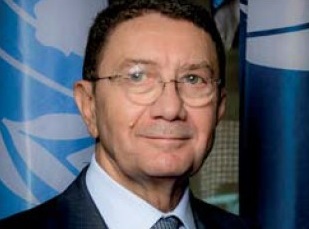
The tourism community, more united than ever
With the conviction of this headline, Dr. Taleb Rifai, current UNWTO Secretary General, shared his thoughts at the opening of the UN World Tourism Organization General Assembly.
Despite the challenges that our sector has been facing in recent years, we are more committed than ever to work closer together to make it a pillar of a better future for people and planet.
The International Year of Sustainable Tourism for Development that we are celebrating globally throughout 2017 has provided us with the platform to reinforce this consensus, which is so important for us to position the tourism sector in the global agenda.
We know that it has not been an easy path. Safety and security challenges and issues arising from the impact of technology and transformative business models add to the pressing need to make our sector more competitive and sustainable. But in the face of those, a stronger, more responsible and more united tourism community has emerged.
We are more determined than ever to maximize the benefits that tourism brings to our societies,
not only as a driver of economic development and peace, but also for its impact on the environment and on cultural preservation. We also see that, more and more, governments and administrations across the world are prioritizing tourism to transform their countries for the better. In the days to come we will be discussing the priorities and work plan of our Organization to ensure that tourism can effectively be a force for good amidst the challenges ahead.
We wish you a fruitful and intense week!
